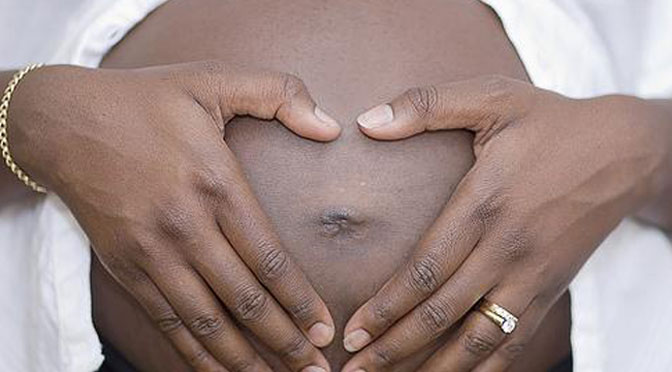Is abortion a tool of promoters of eugenics and Black genocide? This is the burning question addressed in the powerful documentary called Maafa21: Black Genocide in 21st Century America. This Black History Month, Live Action is screening the film — produced by Texas-based pro-life group Life Dynamics, Inc., — on social media. The documentary meticulously details the racist roots of abortion and Planned Parenthood.
In order to protect Planned Parenthood, which had deep ties to the eugenics movement beginning with their founder Margaret Sanger, abortion advocates have claimed that the idea of abortion as a “eugenics tool of Black Genocide” was imagined by pro-life advocates, but nothing could be further from the truth. As Maafa21 demonstrates, it was actually early Black leaders which first decried the genocidal effects of abortion and population control within their community. Author and researcher Robert G. Weisbord explains:
During the 1960’s and continuing into the 1970’s, the charge that birth control and abortion are integral elements of a white genocidal conspiracy directed at African-Americans has been heard with increasing frequency and stridency in black communities. The genocide theory finds greatest acceptance among spokesmen for black nationalist and black revolutionary groups, but suspicion of family planning programs is not limited to them…. The black debate over the desirability of population is traced back approximately fifty years.
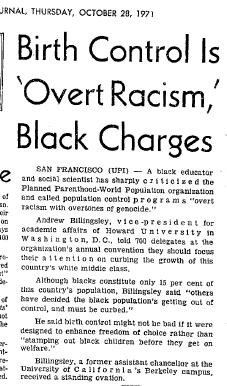
Article: Birth Control is Overt Racism
Some of these Black leaders are listed below.
Dr. Paul Cornely
In 1968, when radical abortion advocates such as Larry Lader were pushing their abortion agenda, civil rights leader Dr. Paul Cornely (then president-elect of the American Public Health Association (APHA) and African American chairman of the Department of Community Health Practice at Howard University) was opposing abortion as a way to “help the poor.” He told the Charleston Gazette that the way to “change existing social conditions is not through marketing abortion available to the poor. We need to find a better way for people to live. We have to look at the total problem – social, economic-education, housing employment….”
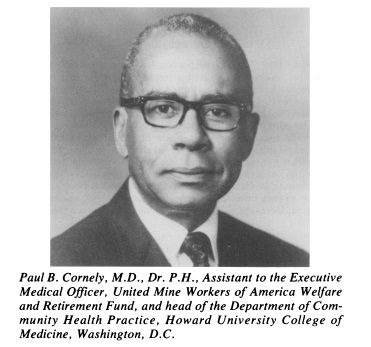
Paul B Cornely opposed abortion and pointed out that abortion, sterilization, and birth control programs have been looked at as forms of racism.
Prof. Norman Rice
Fordham professor Norman Rice perhaps said it best in 1969, when he was quoted in the Saranac Lake Adirondack Daily Enterprise as saying, “The idea seems to be to eliminate poverty by eliminating the poor. Of course, this is a form of genocide, perhaps more appropriately called pooricide.”

Article: Abortion a form of “Pooricide” (Image credit: Saranac Lake Adirondack Daily Enterprise)
Comedian Dick Gregory
Live Action News has previously published statements from notable Black leaders like Fannie Lou Hamer, Dr. Mildred Jefferson, Iowa Rep. June Franklin and Erma Clardy Craven, all of whom viewed abortion and population control as genocide targeted toward their communities. In the early 1970s, comedian Dick Gregory wrote an extensive article, “My Answer to Genocide,” published in Ebony Magazine, where he made similar claims:
Of course, one of the definitions of genocide is, “imposing measures to prevent births within the group” – that is, forcing birth control measures upon Black folks. There is ample evidence that government programs designed for poor black folks emphasize birth control and abortion availability, both measures obviously designed to limit black population.”
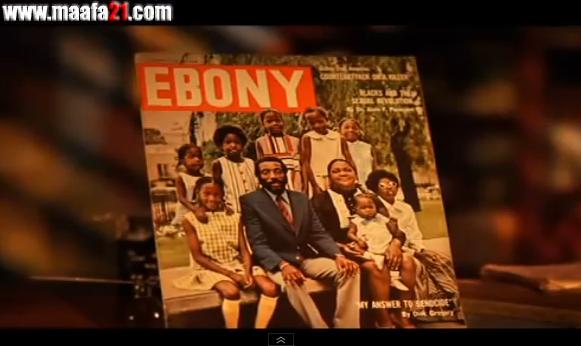
Dick Gregory decries abortion as Black Genocide (Image credit: Maafa21)
In addition to abortion, early Black leaders were also skeptical about birth control being pushed in their community. After all, the concept originated from Planned Parenthood founder Margaret Sanger, a known member of the eugenics community who spoke to members of the Ku Klux Klan.
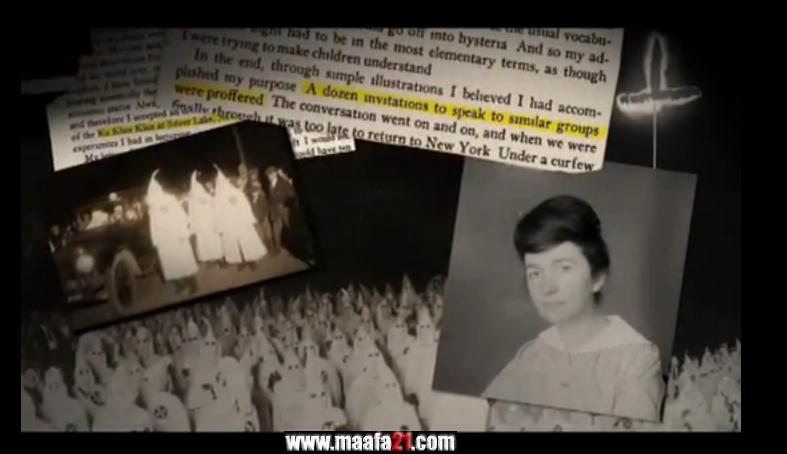
Margaret Sanger spoke to KKK (Image credit: Maafa21)
Author Simone M. Caron’s research, published by the Journal of Social History, lays the groundwork for why Black citizens were so suspicious:
Several events in the late 1960s heightened suspicions of genocide.
The Pittsburgh Courier, a nationally circulated Black newspaper, reported that “a long series of incidents which are covertly building up a phobia among Negroes about racial genocide attempt” took place in 1967 and 1968….
The Black Panther party considered contraception only one part of a larger government scheme of genocide. Drugs, venereal disease, prostitution, coercive sterilization bills, restrictive welfare legislation, inhuman living conditions, “police murders,” rat bites, malnutrition, lead poisoning, frequent fires and accidents in run-down houses, and black over-representation in Vietnam combat forces all contributed to the malicious plan to annihilate the black race…
In the summer of 1967 the… Black Power Conference in Newark, New Jersey, passed an anti-birth-control resolution that contained the key phrase, birth control equals “black genocide.”
Black Caucus
In 1970, according to Maafa 21, the Black Caucus walked out of the First National Congress on Optimum Population and Environment being held in Chicago. Felton Alexander of the National Urban League and the Chairman of the Black Caucus said the action was taken because of clear and unmistakable evidence that the purpose of the conference was to legitimize the extermination of the black population.
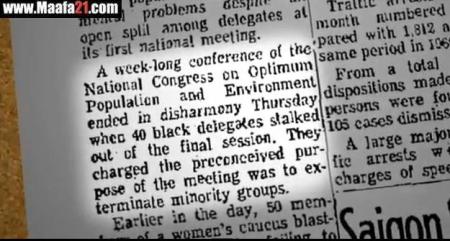
Black Caucus walks out of Population Conference (Image credit: Maafa21)
Black Panther Party
They were not the only Black groups suspicious of abortion. As mentioned earlier, the Black Panthers were as well. In 1971, a Detroit Chapter of the Black Panther Party expelled one of its leaders from the organization for simply asking where she could obtain an abortion, according to Maafa21. At the time the party proclaimed, “A true revolutionary cares about the people–he cares to the point that he is willing to put his life on the line to help the masses of poor and oppressed people. He would never think of killing his unborn child.”
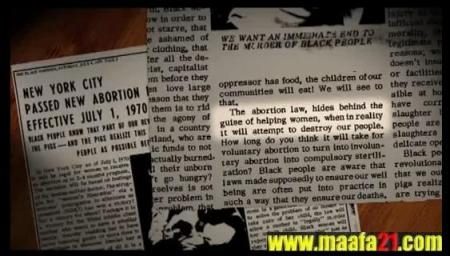
Black Panther Party Quote on abortion (Image credit: Maafa21)
Jet magazine quoted from the [Black] Panther newspaper in 1973:
The abortion law hides behind the guise of helping women when in reality it will attempt to destroy our people. How long do you think it will take for voluntary abortions to turn into involuntary abortion, into compulsory sterilization? Black people are aware that laws made supposedly to ensure our well-being are often put into practice in such a way that they ensure our deaths.
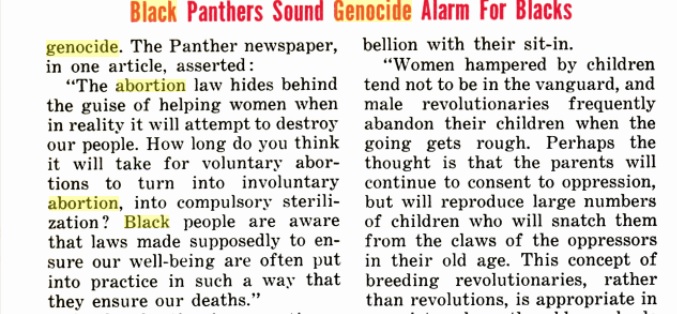
Black Panthers see abortion as Black Genocide (Image credit: Jet Magazine March 22, 1973)
Various Black clergy
Black clergy were also outspoken against abortion as genocide. Black Catholic Priest, Father George Clements, told Jet Magazine in that same 1973 edition, “I believe the entire question of abortions is just one more in the continuous series of events to eliminate the Black population.”
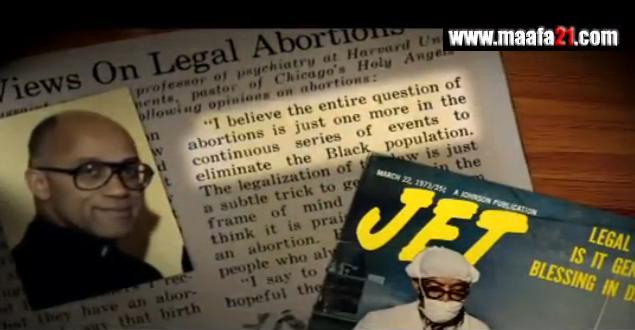
Black priest sees abortion as Black genocide (Image credit: Maafa21)
In a February edition of the magazine, Fr. Clements pointed out, “There is a grave contradiction being practiced in the U.S. In the Black or Ghetto areas Planned Parenthood or birth control clinics are set up, whereas, in the white communities or suburbs, fertility centers are being established.”
The Progressive National Baptist Convention also denounced abortion, according to this July 28, 1973, Jet Magazine article seen below:
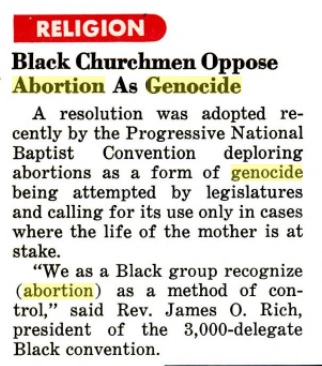
Black religious leaders abortion is genocide (Image credit: Jet Magazine July 26, 1973)
Rev. Jesse Jackson
In a separate 1973 Jet Magazine article, the Rev. Jesse Jackson, a known civil rights leader of his day, also called abortion “genocide.” Then, two years later, Rev. Jackson joined with anti-abortion organizations and endorsed a Constitutional Amendment banning abortion.
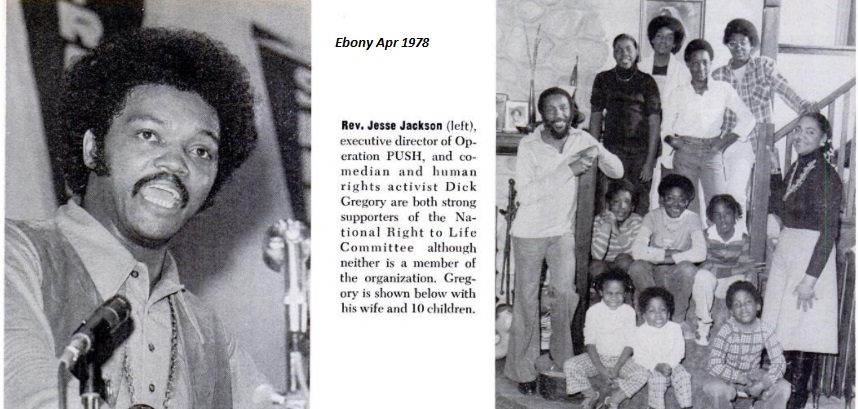
Jesse Jackson and Dick Gregory part of Right to Life anti-abortion (Image credits: Ebony)Magazine
And, in 1977, Jackson observed, “It is strange that they chose to start talking about population control at the same time that Black people in America and people of color around the world are demanding their rightful place as human citizens and their rightful share of the material wealth in the world.”
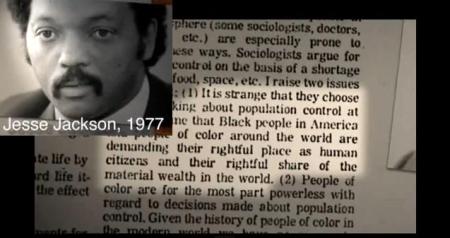
Jesse Jackson on abortion (Image credit: Maafa21)
Sadly, in the mid-1980s, Jackson changed his position and became pro-abortion.
Journalist Samuel Yette
Black journalist, Samuel Yette, also saw abortion and birth control as a means of genocide in the African American community. Yette became the first African-American reporter hired by Newsweek Magazine and, by 1968, according to Maafa21, “he quickly rose to the position of Washington D.C. bureau correspondent. Three years later, he wrote a book in which he documented that there were high-level plans within the United States to use birth control and abortion as genocide against African-Americans. Immediately after his book was released to the public, Mr. Yette was fired.”
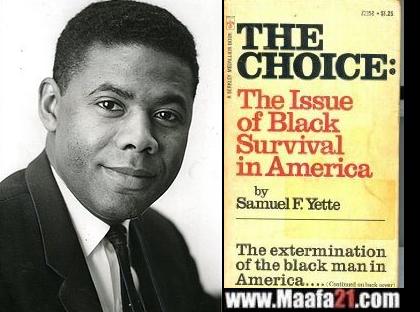
Samuel Yette and his book The Choice (Image credit Saynsumthn blog)
Yette’s book, “The Choice: The Issue of Black Survival in America,” describes how government solutions for the poor stressed the necessity for birth control as the best means of alleviating hunger. Yette documented that mandatory abortions for unwed mothers were recommended at a 1969 White House Conference on the topic. The effort, he notes, was blocked by Black activist Fannie Lou Hamer, who denounced abortion as “legalized murder” and called it a plot to exterminate the Black population. In almost a sarcastic tone, Yette once pointed out the irony in how easy it was for Blacks to obtain free abortions but not free medical care, writing, “It is still a society in which an injured man must show his ability to pay before getting hospital services, but his daughter or wife can be aborted or fed birth control pills, at public expense…”
In 1985, Yette told supporters:
Any public policy that condones, encourages, or participates in the taking of life on the pre-birth side of the womb, anticipates and works toward the policies and practices and the same rationales that destroy life on the after birth-side of the womb.
Given the history of the genocidal practices and public policies impacted on black people in the society, it is barely believable that any significant number of black people at all could condone, much less demand, public policies and financing the destruction of human life on either side of the womb.
Dr. Mildred Jefferson
In the 1970’s the largest anti-abortion organization in the nation was led by Black doctor, Mildred Jefferson:
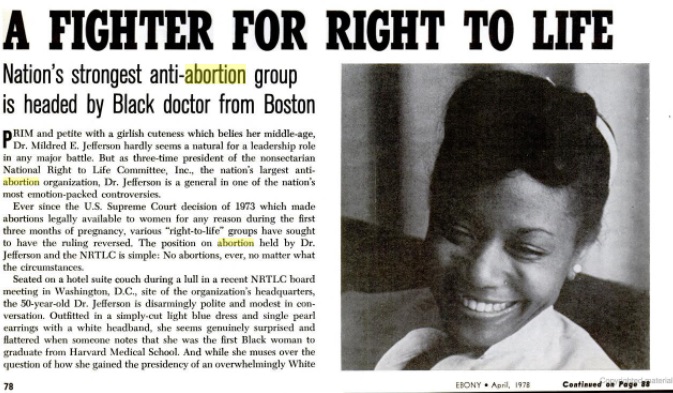
Black doctor Mildred Jefferson leads national Right to Life antiabortion group (Image credit: Ebony Magazine)
According to Ebony Magazine, “One reason for Dr. Jefferson’s alignment with the anti-abortion movement is her belief that this country’s one million annual abortions can mean genocide for Black Americans.”
NAACP
Members of a Pittsburgh chapter of the NAACP, which charged that Planned Parenthood facilities in Black neighborhoods were paramount with genocide. According to the New York Times, “The N.A.A.C.P. contended in its statement that Planned Parenthood clinics here were operated ‘without moral responsibility to the Black race and become an instrument of genocide to the black people.'” Dr. Charles Greenlee, a black physician, along with NAACP president Byrd Brown, charged that Planned Parenthood facilities were keeping the birth rate down.
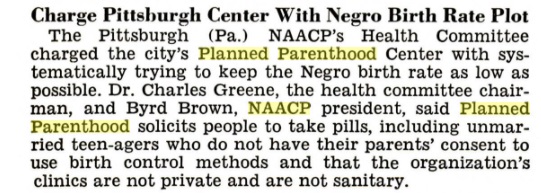
NAACP opposed Planned Parenthood (Image credit: Jet Magazine Jan. 11, 1968)
Although Dr. Greenlee eventually walked back the term “genocide,” the group noted how Planned Parenthood was strategically placing its facilities in neighborhoods with high Black populations, something today’s African American leaders also point out.

NAACP leader accuses Planned Parenthood of genocide (Image Credit: New York Times Dec 17, 1967)
***
Soon, even Planned Parenthood was taking note of the opposition facing them. They actually exchanged internal memos about this fear that abortion and Planned Parenthood was seen as Black genocide. They would query members of the Black community to ascertain how they were being viewed.
In 1962, Wylda B. Clowes, a Black field consultant for Planned Parenthood, and Mrs. Marian Hernandez, director of the Hannah Stone Center, met with Black militant leader, Malcolm X to “discuss with him his group’s philosophy concerning family planning.” The memo to Guttmacher described the encounter: “In trying to ascertain Malcolm X’s knowledge and understanding of the Planned Parenthood organization, he responded in a positive way to the name by saying, that Black Muslims are interested in anything having to do with planning. He asked if Planned Parenthood has anything to do with birth control, and offered the suggestion that we would probably be more successful if we used the term family planning instead of birth control. His reasons for this was that people, particularly Negroes, would be more willing to plan than to be controlled.”

Planned Parenthood memo with Malcolm X
Planned Parenthood’s own national director of community relations, Douglas Stewart, once acknowledged the friction their organization had with Black women, telling Ebony Magazine, “Many Negro women have told our workers, there are two kinds of pills – one for white women and one for us… and the one for us causes sterilization.” To lessen these fears, Planned Parenthood added individuals from the Black community to their board. “It is my opinion as director of community relations,” Stewart went on to tell Ebony, that “birth control programs might fare better in large cities if more black people and members of minority groups were represented on planning boards of clinics in their neighborhoods.”
But after New York decriminalized abortion and an abortion facility opened in Harlem, a member from Harlem’s Hospital staff told the NYT that they “were met with opposition from the community…. The militant movement was pretty strong, and they thought it was genocide.”
In the early 1970s, a report by Black researcher Dr. William A. Dariety concluded, according to the NYT, that the idea of abortion as Black genocide had “large support in the Negro community.”
“In one New England city,” writes the NYT, “Dr. Dariety found that 88 percent of the black males under 30 were opposed to abortion and almost half of them felt that encouragement of the use of birth control ‘is comparable with trying to eliminate [blacks] from society.'”
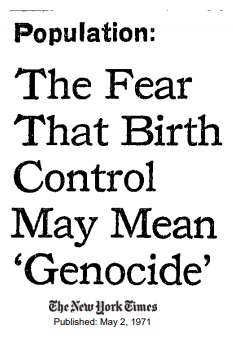
1971 Article The fear that birth control may mean genocide
In 1990, Pervis L. Edward wrote this to Ebony Magazine:
The fact that genocide in the form of abortions is being considered as a possible solution to problems within the Black community is testimony to the fact that we as a people are suffering from chronic amnesia. Black Americans have forgotten once again that they have an adversary determined to enslave, destroy and ultimately eliminate them from the face of the planet. For this reason we must unite and meet this assault at its point of contact and defend the lives of our unborn children, for therein lies our future.
Edward was responding to an article published previously by Ebony, which featured Pamela Carr of Black Americans for Life and Faye Wattleton, Planned Parenthood’s first Black president. Carr wrote that abortion was not a solution for Black problems.
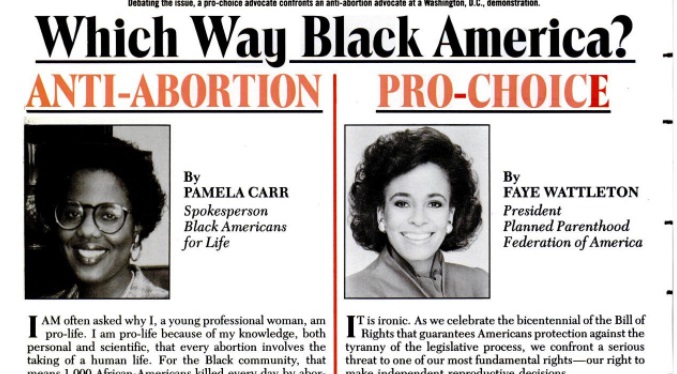
Article on abortion published in Ebony Magazine October 1989
“No, abortion is not a solution,” Carr states, “because it undermines the very ideals previous Black leaders stood for – the belief that each life is valuable and has something to contribute; whether Black or White, born or unborn…. Abortion is offered as a solution to help young Blacks to forge forward to overcome present hindrances and strive for brighter tomorrows…. By allowing 400,000 Black babies to be systematically killed every year, we as African Americans have strayed from the path of the leaders who fought so hard for our freedom. They would be alarmed today at how we forfeit the lives of our children, and, as a result, our future.”
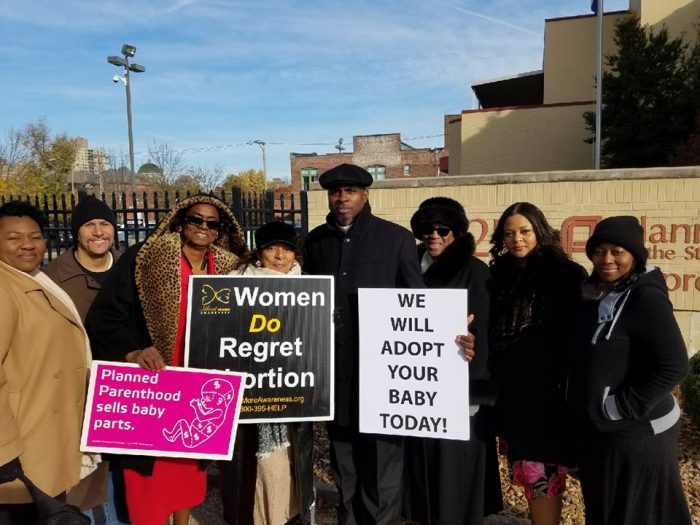
COGIC Black Pastors and Bishops pray outside Planned Parenthood
As the Reverend Johnny Hunter states at the end of Maafa21:
The point is not that killing a Black child is worse than killing a white child. It’s not. Regardless of the victim’s skin color, eye color, or hair color, legalized abortion is a crime against all of humanity…. The time has come, for us to wake up. The time has come for us to realize that our people are no longer being illegally lynched one or two at a time, at the end of a dirt road. It’s time to for us to realize that our people are being womb-lynched!
It is time to realize that they are being legally ripped to shreds by millions in air conditioned rooms with sweet soft elevator music playing in the background. It is time for us to realize that we are in a war. We are in a war that if we don’t become involved and we try and look the other way, it’s going to wipe us out – it is called Black genocide. It’s time to realize that we have found the weapon of mass destruction and the weapon of mass destruction is the suction machine in Planned Parenthood. Knowing what we know now, we can no longer look the other way.
Today, armed with the tragic statistics showing how abortion is decimating the Black community, Black men and women alike continue to speak out against Planned Parenthood and abortion. Black leaders across the nation have organized to educate their communities on the Black genocide of abortion and Planned Parenthood. Groups like LEARN (a.k.a. BlackGenocide.org), the National Black Pro-life Coalition, Restoration Project, The Frederick Douglass Foundation, Black Americans for Life, Civil Rights for the Unborn, the African American Outreach of Priests for Life, The Radiance Foundation, Protecting Black Life, Missouri Blacks for Life, Issues for Life, Church of God in Christ’s (COGIC) Family Life Campaign and many more are outspoken about abortion within their community.
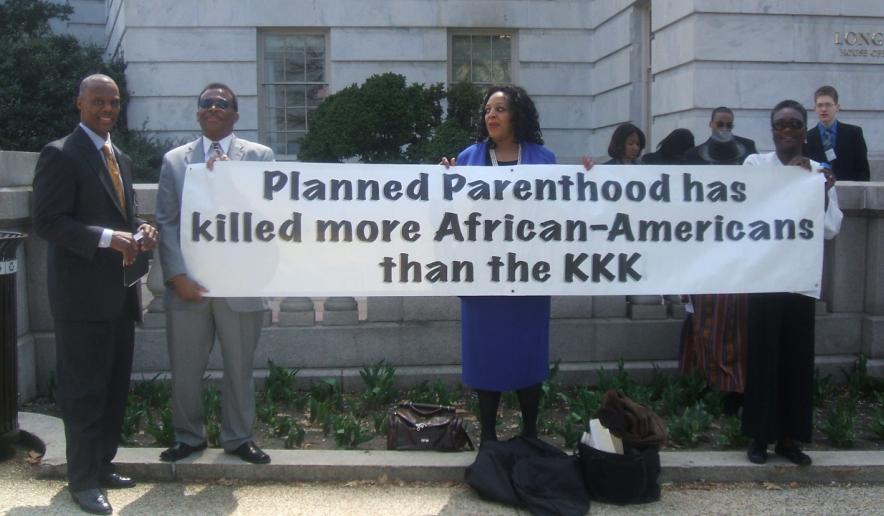
Black leaders compare Planned Parenthood to the Klan
Their efforts have not gone unnoticed by Planned Parenthood, which views Black pro-life leaders as a legitimate threat to their eugenics agenda. In response, abortion advocates across the nation are systematically calling for the abortion corporation to replace Cecile Richards — who announced her intentions to resign earlier this year — with a Black CEO. They seem to believe that simply placing a Black American at the helm of the organization will erase years of eugenics history along with volumes of documentation proving the organization’s eugenics ideology goes well beyond founder Margaret Sanger.
The reality is that films like Maafa21 are helping to awaken the Black community to connect the dots from slavery, to evolution, to eugenics, to abortion, and to Planned Parenthood as part of a continuum of terrible suffering, racism, and targeting that they have endured for years. Dr. Alveda King, niece of Dr. Martin Luther King, Jr., points out in Maafa21, “We need to pay attention to the fact that in the 1960s when we as African Americans begin to demand our civil rights, for the first time in American history, there began a widespread cry in our government for legalized abortion. Was that a coincidence, too? Or, could it be that when we said we would no longer sit on the back of the bus, a place was being reserved for us down at the abortion clinic?”
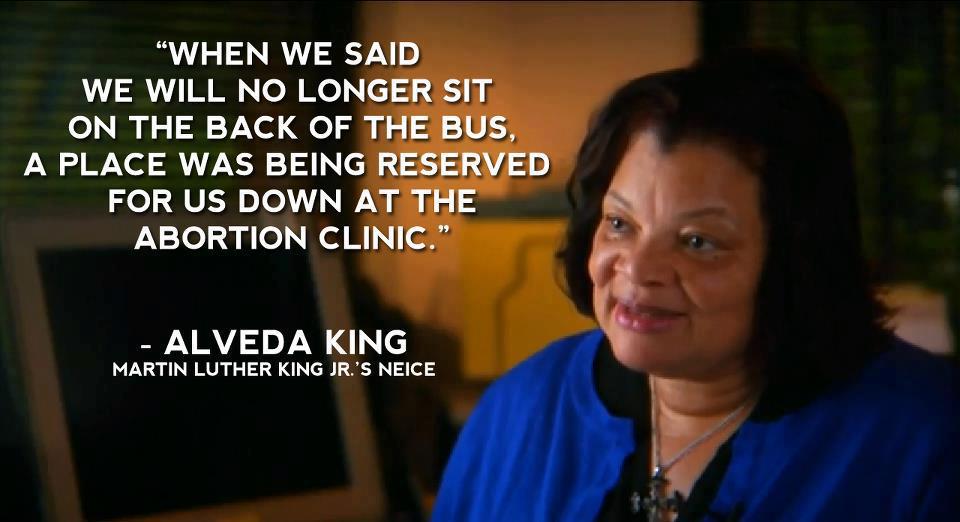
Dr. Alveda King in Maafa21
Today, rather than acknowledge this growing group of Black activists opposing Planned Parenthood, the media demeans their voice and censors their message, a tactic successfully used to keep Black people oppressed in the past.
The only problem for the media is that this time, it’s not working.

